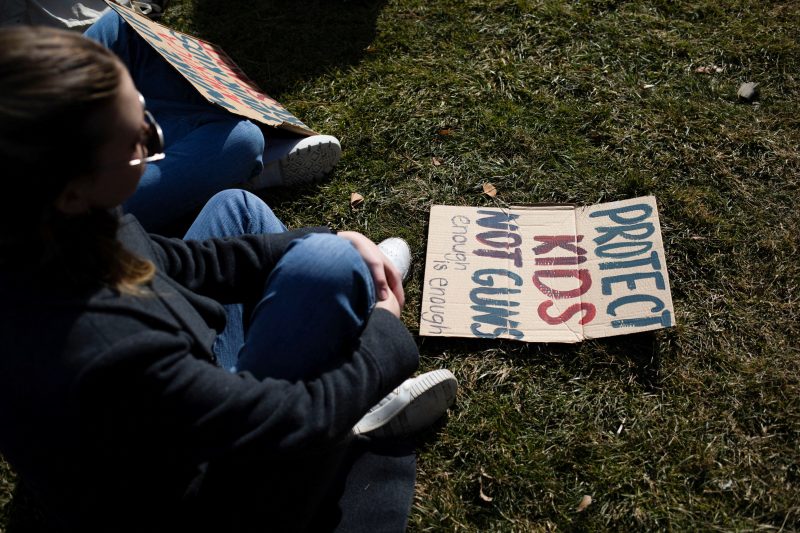For nearly a decade, Republicans have successfully stalled bills that would tighten gun control in Minnesota and Michigan.
But after Democrats swept to complete control in both states in November, those proposals are on a fast track, with some expected to become law within weeks — a sign of how newly empowered liberal lawmakers in those states and elsewhere are asserting themselves on gun legislation amid the latest wave of mass shootings.
In Minnesota, where Democrats flipped the state Senate, lawmakers are scheduled to hold hearings this month on bills requiring safe storage of firearms and universal background checks for gun purchases. They will also consider extreme-risk protection orders, often called “red-flag laws,” which prevent a person who is deemed a threat to themselves or others from possessing a gun.
A similar package of gun legislation will be voted on this month in Michigan, where Democrats flipped both chambers and where three students were killed and five critically injured in a mass shooting at Michigan State University last month. Democrats are also proposing wide-ranging gun-control bill packages in Maryland and Massachusetts, both blue states where they wrested control of the governor’s office in November.
“We’re in a unique position to do something about this right now,” Michigan Lt. Gov. Garlin Gilchrist II (D) said Wednesday about the state’s gun legislation. “This moment is opportunity and the leaders are in place right now that the voters of Michigan decided needed to be in place for such a time as this. It is our moment to act and we will.”
This movement is happening, however, as gun control laws face an unprecedented legal threat because of last year’s Supreme Court’s ruling that threw out a New York law restricting concealed weapons. That ruling in a case called New York State Rifle & Pistol Association v. Bruen has spurred a new nationwide spate of legal challenges to long-settled gun restrictions and left courts unclear on what laws should stand.
“I guarantee all these laws will be challenged on Second Amendment grounds,” said Jacob D. Charles, a Pepperdine University professor who specializes in firearms law. “A lot of laws that were previously viewed as constitutional are suddenly cast into doubt because of the Bruen ruling. And if a judge decides to enjoin the law while it is being challenged, it could be years before it goes into effect.”
Emboldened by that ruling, Republicans are also pushing to expand gun rights in states where they control both state chambers and the governor’s office. In total, Republicans control 22 states and Democrats control 17, while control is split in 10 states.
The Nebraska legislature advanced a bill last week that would allow people to carry a concealed weapon without a state permit and without passing a gun safety course. In Idaho last week, the House passed two bills to ban taxpayer funds from businesses that boycott the firearms industry.
November’s elections marked a reversal for Democrats, who have long trailed the GOP in down-ballot races for state offices. Democrats in Michigan, Minnesota, Maryland and Massachusetts secured new trifectas of both chambers and the governor’s office. The last time Democrats controlled both the legislature and the governor’s office in Michigan was 1983 and the last time in Minnesota was 2014.
That’s enabled lawmakers to advance long-stalled bills on everything from expanding affordable housing to enshrining abortion rights. According to the States Project, a national Democratic group that helped fund candidates in the two states, the Minnesota Senate and the Michigan House passed more bills in January than the first month of the last six sessions combined.
That shift is particularly stark on gun legislation. During the last legislative session, more than 100 gun control bills were introduced in those states, according to Giffords Law Center to Prevent Gun Violence. All of them failed — and few received hearings.
“For several years now, we’ve passed these bills in the House — extreme risk protection orders, universal background checks — but have been blocked by the Republican controlled Senate,” said Minnesota state Rep. Dave Pinto (D). “The change is that we can actually have our bills heard and considered in ways that we just never could have before.”
Everytown for Gun Safety has also played a role in advancing Michigan and Minnesota’s firearms legislation. In November, members of its volunteer arm — Moms Demand Action — won 89 seats in state legislatures. Nine of those new lawmakers are in Michigan, with six in Minnesota.
“One of the reasons we have trifectas in Michigan and Minnesota is our own volunteers ran for office and won,” said Everytown President John Feinblatt. “By flipping those states it opens the pathway to pass important legislation that has stalled in the past.’
Democrats are also working in the wake of the Bruen ruling to protect existing laws from new legal challenges. In five states with gun permit laws similar to the standard overturned by the Supreme Court in New York, lawmakers are working to carve out new rules that could pass legal muster, as well as creating new bans on carrying weapons in places like courtrooms or public parks.
“All six states that were affected have introduced public carry bills that will make sure they are protecting their citizens, with language that is based on what the Supreme Court decided,” said T. Christian Heyne, vice president of policy at Brady United Against Gun Violence, which has helped draft the legislation.
State gun rights groups are mounting efforts to defeat the bills in the newly Democratic state legislatures.
The Minnesota Gun Rights has set up a form letter for members and boasts of “mounting the largest defense of our Second Amendment that Minnesota has ever seen.” The Michigan Coalition for Responsible Gun Owners says it is lobbying against the measures there, noting that its “biggest concern is Republican legislators trading their votes on gun control bills. However there has been no indication to date of any Republican defections.”
The bill authors say that although Democrats have the power to finally act on the long-standing legislation, the efforts would fail without party unity in the narrowly controlled legislatures.
Pinto, the Democratic lawmaker from Minnesota, said bipartisan gun control laws tend to pass only after high-profile mass shootings. For that reason, he believes Michigan might have an easier time passing bills that are not strictly along party lines.
“We really can’t count on a single Republican vote,” Pinto said. “They’ve made that really clear through the years and have continued to do so. We have the majority, but it’s by a slim margin. So, you know, nothing is a slam dunk.”








